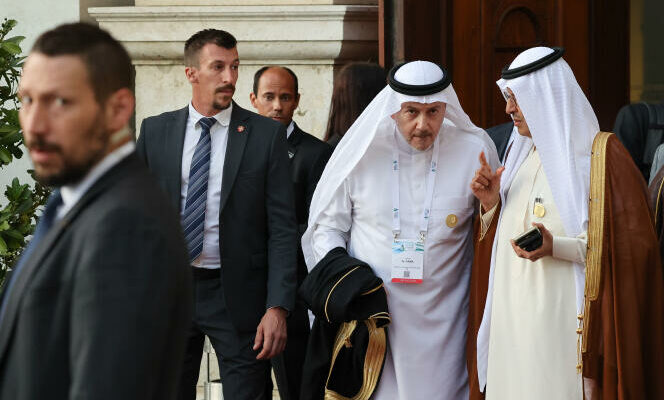The year begins with a warning shot among oil companies. Unilaterally, Saudi Arabia is preparing to cut its official selling price, as if the kingdom wanted to reiterate the extent of its room for maneuver and, above all, preserve its market share in the face of competition. Including among the other members of the Organization of the Petroleum Exporting Countries (OPEC), of which he is the undisputed leader.
His company, Saudi Aramco, world number one, plans a significant rebate. Up to 2 dollars (around 1.82 euros) drop for barrels of crude marketed in Asia, from 1er FEBRUARY. This is the largest discount in twenty-seven months, noted the Reuters press agency on January 7.
For the moment, the indicators have reacted timidly in this globalized market. Thursday January 11, in Europe, the barrel of North Sea Brent was up slightly from one day to the next: around 77 dollars (+ 0.79%). Ditto for its American equivalent, West Texas Intermediate, barely above 72 dollars (+ 0.91%).
With its February sales, the world’s leading exporter intends above all to maintain its customers and its income. It seems that he now fears losing part of it, and that he is tired of making the greatest efforts in the ranks of OPEC.
Stabilize prices
In fact, since July 2023, the Gulf monarchy has left around 3 million barrels underground every day: it extracts 9 million instead of 12. The measure, renewed at least until March, aims to stabilize prices at a high level. It has so far met with mixed success. Certainly, in September 2023, the barrel of Brent almost returned to the symbolic bar of 100 dollars. But here it is again, now, under 80 dollars.
“OPEC, as an instrument for regulating the oil market, relies above all on Saudi Arabia”, insists Marc-Antoine Eyl-Mazzega, director of the Energy and Climate Center at the French Institute of International Relations. For other members of the organization, the room for maneuver is otherwise limited.
Even within the structure, production quotas fuel tensions. Especially when it comes to applying collective reductions. To avoid such obligations, Angola recently left the cartel. Since 1er January, it now has twelve members: the five co-founders of 1960 (Saudi Arabia, Iran, Iraq, Kuwait and Venezuela), as well as another Middle Eastern state (the United Arab Emirates) and six African countries (Libya, Algeria, Nigeria, Gabon, Equatorial Guinea and Congo). “Most members are not able to produce more and are already trying to produce everything they can, to guarantee political, economic and social stability in their country”, underlines Mr. Eyl-Mazzega. Quota exemptions even exist for Libyans, Venezuelans and Iranians.
You have 45% of this article left to read. The rest is reserved for subscribers.
